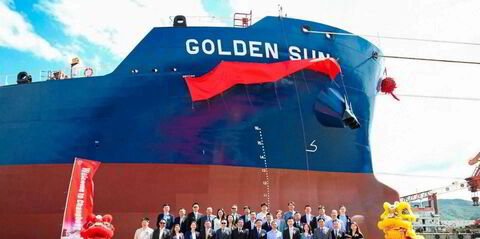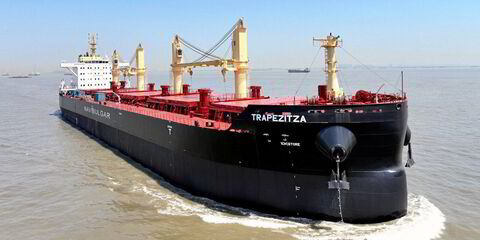Atlantic Bulk Carriers became one of the few Greek companies to declare its preferred future fuel option and urged peers to no longer prevaricate on the matter.
The traditional owner has opted for methanol and will build its future vessels to be ready for that particular technology when it next orders newbuildings, Atlantic Bulk technical director Panos Zachariadis said on Tuesday.
“Compared to the alternatives, it’s night and day,” the Greek executive told the Maritime Cyprus Conference in Limassol.
Atlantic Bulk, a company managing a fleet of 19 ultramaxes and supramaxes built between 2006 and 2020, has ruled out ammonia and hydrogen as alternatives.
Hydrogen tanks take up too much space on a bulker, while ammonia is outright “nasty”, Zachariadis said.
Meanwhile, he brushed aside criticism of methanol.
Following a remark on the panel Zachariadis took part in that methanol was flammable, he responded in a deadpan voice that diesel was flammable too.
“I also read you shouldn’t drink it [methanol], it’s not good,” Zachariadis said.
When it comes to the future availability of the fuel, Zachariadis said it was up to shipowners to create the supply they need, instead of sitting on the sidelines and waiting for players outside the maritime industry to deliver.
He said the fact shipping giants such as AP Moller-Maersk opt for methanol does not automatically mean that smaller players have to be deprived of the fuel.
“If the rest of us would make up our minds instead of looking into options that aren’t, in my opinion, so viable, then the producers ... would know that shipowners want methanol,” he said.
“Then you start the gears working to finally produce the fuel that the market wants.”
It is in that context that Zachariadis expressed personal disagreement with the position of the Union of Greek Shipowners that it is technology-neutral and that its members will opt for whatever fuel scientists point to as the most appropriate.
“It should be you, the ship-owner, that will tell everyone what fuel you prefer,” he said.
Uncertainty about future fuels is partly responsible for a considerable drop in bulker and tanker newbuildings lately, as shipowners hesitate to make choices as to which type of fuel will prevail.
The reluctance is particularly marked in Greece, where owners have a century-old tradition of investing in new technologies only when their profitability is proven.
However, Zachariadis said the moment to act is now.
“If I want to charter my ship with a big charterer, I have to give him my green credentials,” he said. “Otherwise, I don’t get a contract. Pressure starts from the public ... everything is changing.”




